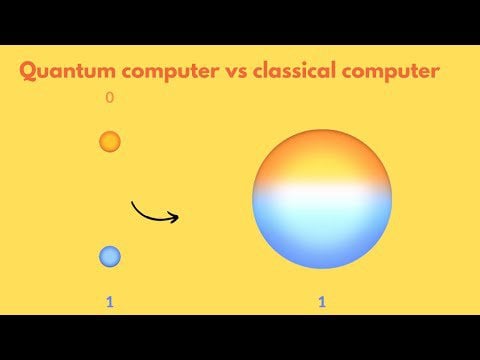As the realms of technology and physics converge, one question increasingly reverberates through both academic and industrial circles: Is there any computing paradigm that surpasses the remarkable capabilities of quantum computing? To engage this query comprehensively, it is imperative to delve into the nuances of both quantum and classical computing, examine emerging computational methodologies, and consider the inherent limitations that may preclude any computation from achieving unparalleled efficiency.
At its core, quantum computing harnesses the peculiar principles of quantum mechanics, leveraging phenomena such as superposition and entanglement. Unlike classical bits, which exist as either 0 or 1, quantum bits or qubits inhabit a state of both values simultaneously. This allows quantum processors to conduct computations in parallel, subsequently accelerating problem-solving intractable for classical computers. In domains such as cryptography, optimization problems, and complex simulations, quantum computers have demonstrated potential that utterly dwarfs traditional computational power. However, the question of whether any computing faction could potentially outpace quantum computing necessitates a deeper exploration of alternative paradigms.
Recent advancements in classical computing architectures have birthed novel models such as neuromorphic computing and optical computing. Neuromorphic computing, which emulates the architecture of the human brain, offers a stylized approach to data processing. By utilizing spiking neural networks, these systems can perform operations in a method akin to biological processors. This architecture challenges the linear progression of traditional computing, aiming for extraordinary energy efficiency and superior real-time processing capabilities. However, while neuromorphic systems excel in specific tasks, they remain tethered to the constraints of traditional bit-based processing—foregoing the quantum advantage of superposition and entanglement.
Similarly, optical computing presents substantial promise. By leveraging the properties of light rather than electrons, optical systems can potentially offer unparalleled speeds and bandwidths due to light’s inherent properties. Photonic qubits can exist in various states simultaneously, akin to their quantum counterparts. Some theorists argue that a fully realized optical computing system could deliver performance on par with quantum devices. Yet, developing a scalable and reliable optical computing architecture remains an elusive goal. Practicality and material limitations currently conciliate against the prospect of overtaking quantum computing.
Moreover, the exploration of classical computing methodologies extends into the realm of unconventional computing, where innovative approaches such as DNA computing and quantum-dot cellular automata are investigated. DNA computing relies on biochemical processes to perform calculations, dramatically increasing data storage density and parallelism. Although theoretically astonishing, challenges in reliability and error correction hinder DNA computing from achieving mainstream viability. Meanwhile, quantum-dot cellular automata presents a miniaturized approach to computation that may conceivably rival quantum processors. However, practicality and the current immaturity of these technologies pose hurdles to their supremacy.
An intriguing possibility arises when contemplating hybrid computing systems that amalgamate classical and quantum computing methodologies. Quantum-classical hybrid architectures may effectively exploit the strengths of both paradigms, enveloping the rapid processing capabilities of classical systems with the extraordinary problem-solving prowess of quantum computing. Such symbiosis could lead to transformative improvements in application domains ranging from artificial intelligence to large-scale simulations. Yet, could these hybrids emerge as superior entities, or will they merely coexist, yielding different advantages in distinct scenarios? This question ignites tantalizing debates among specialists and futurists alike.
Despite the promising advances encapsulated within alternative computing paradigms, a substantial portion of the discourse centers around the limitations of quantum computing itself. Quantum systems are profoundly afflicted by decoherence and noise, which can severely impair error correction capabilities. Consequently, while raw computational potential is prodigious, the viability of maintaining stable quantum states remains a significant bottleneck. Researchers actively pursue fault-tolerant quantum computing and error correction protocols, yet the timeframe for practical, scalable quantum computing remains uncertain, casting shadows over its long-term supremacy.
Additionally, computational problems vary significantly in their inherent complexity and resource requirements. Quantum computers are not necessarily superior across all problem domains. Indeed, many computational challenges remain well-suited for classical systems, revealing a complementary rather than adversarial relationship between both paradigms. The realization that not all tasks benefit equally from quantum advantages invites a paradigm shift in perspective, urging consideration of bespoke computational approaches tailored to specific problems.
In summation, the inquiry into whether any computing modality can eclipse quantum computing fosters an engaging discussion within contemporary computational theory and practice. Emerging paradigms such as neuromorphic, optical, and unconventional computing present enticing possibilities, yet each bears limitations that hinder outright superiority over quantum systems. Quantum computing defies simple categorizations of power; its potential illuminates unprecedented pathways while simultaneously engendering myriad challenges. As the exploration of hybrid architectures burgeons, the interplay of classical and quantum paradigms begins to paint a vibrant tapestry of computational potential. Thus, rather than seeking a singular victor in the saga of computation, humankind might best embrace an integrative framework that harmonizes the distinctive advantages of diverse systems, unlocking a fissile realm of unprecedented possibilities.












